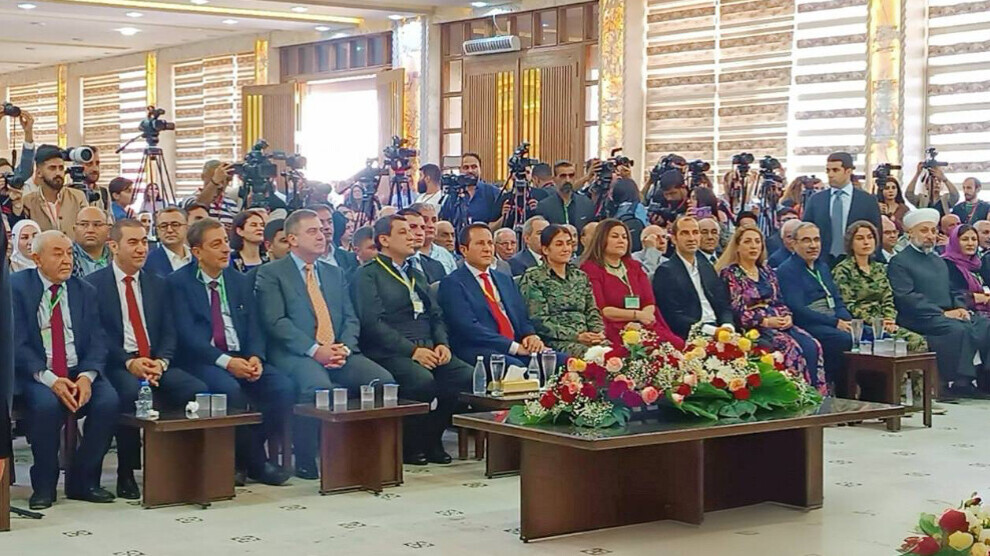Final document of the Kurdish Unity Conference in Rojava
The final document of the Kurdish Unity Conference in Rojava calls for the unification of Kurdish regions under a federal Syrian umbrella as an integrated political and administrative unit.
The final document of the Kurdish Unity Conference in Rojava calls for the unification of Kurdish regions under a federal Syrian umbrella as an integrated political and administrative unit.

The Conference on Kurdish Unity and Common Stance in Rojava, held in Qamishlo on Saturday, ended with the adoption of a comprehensive document containing numerous decisions. Over 400 delegates from various parts of Kurdistan and Syria took part in the conference, which aimed to strengthen Kurdish unity and establish common political positions.
The unanimously adopted document contains key provisions on both the Syrian nation state and the Kurdish national entity:
SYRIAN NATIONAL ARENA
1. Syria is a multinational, multicultural, multi-religious state that guarantees the rights of all Syrian components, including Arabs, Kurds, Syriacs, Assyrians, Circassians, and Turkmen, as well as Alevis, Druze, Yazidis, and Christians, through constitutional and superconstitutional principles.
2. The state should comply with international treaties and agreements, human rights, and the principle of equal citizenship.
3. The Syrian system of government should be a bicameral parliamentary system that embraces political pluralism, the peaceful transfer of power, and the separation of powers. It should also be based on regional councils within the frame of a decentralized system.
4. A decentralized Syria should include a fair distribution of power and wealth between the center and the regions.
5. The name, flag, and national anthem of the state should reflect the national and cultural pluralism of Syrian society.
6. The state's neutrality toward religions and beliefs, the right to practice religious rituals and worship, and the recognition of the Yazidi religion as an official religion of the state.
7. A comprehensive national identity that takes into account the characteristics of different components should be adopted.
8. Gender equality and gender representation in all institutions in Syria should be ensured.
9. The children’s rights declared in agreements by the United Nations and Amnesty International should be protected, and care and support should be provided appropriate to the nature and age of children, taking into account their special needs in accordance with the characteristics of the regions where they live and the opportunities available in those regions.
10. Existing administrative divisions should be reviewed, taking into account population density and geographical area.
11. Looted and stolen Syrian historical artifacts and monuments within and outside the country should be returned.
12. Demographic change in Kurdish regions and all regions of Syria should be prevented and stopped. Forcibly displaced persons, including the residents of Serêkaniyê, Girê Spî, and Efrîn, should be allowed to return safely to their homes.
13. To formulate democratic principles and establish a government with full executive authority representing all Syrian factions and components, a constituent assembly comprising representatives of all Syrian components should be established under international supervision.
14. The right to express oneself in one's mother tongue, the right to education, and the implementation of culture should be granted for all components.
15. March 8 should be declared as Women's Day.
KURDISH NATIONAL ARENA
1. The unification of Kurdish regions under a federal Syrian umbrella as an integrated political and administrative unit.
2. Recognition of the Kurdish people's national existence in Syria as an indigenous people. Ensuring their national rights, including the right to freely and equally exercise their political, cultural, and administrative rights, in accordance with international agreements and treaties, through constitutional guarantees.
3. Honoring the sacrifices of the martyrs of the Syrian revolution, the Syrian Democratic Forces (SDF), security forces, those who lost their lives in prisons, and those who died in the resistance against ISIS massacres, supporting their families, and guaranteeing their rights in accordance with legal regulations.
4. Treating youngsters as an effective force in society, and ensuring their fair participation and representation in all state institutions.
5. Recognizing Kurdish as an official language alongside Arabic in the constitution, and providing Kurdish education and learning.
6. Establishing centers and departments related to the Kurdish language, historical heritage, and culture; opening media centers such as radio and television channels broadcasting in Kurdish; publishing books, magazines, and other publications; and establishing work and research centers.
7. Ensuring the participation of Kurds in the legislative, judicial, executive, and security institutions of the state.
8. Recognizing March 21 as Newroz, a national holiday, and March 12 as the Day of Remembrance of the Qamishlo Uprising.
9. All exceptional policies, measures, and laws such as the Arab Belt Project against the Kurds and Arabization operations in Kurdish regions must be revoked, and compensation must be paid to those who have suffered from these discriminatory policies. The state prior to the implementation of these policies must be restored, and secret and public agreements affecting Syria's sovereignty and the existence of the Kurds must be revoked.
10. Restoring Syrian citizenship to Kurdish citizens who were stripped of their citizenship as a result of the exceptional census of 1962 and whose names were not recorded.
11. Allocating a percentage of the revenues generated from the wealth to development and reconstruction efforts in the Kurdish regions, given the deliberate exclusion and neglect of these regions in the past.